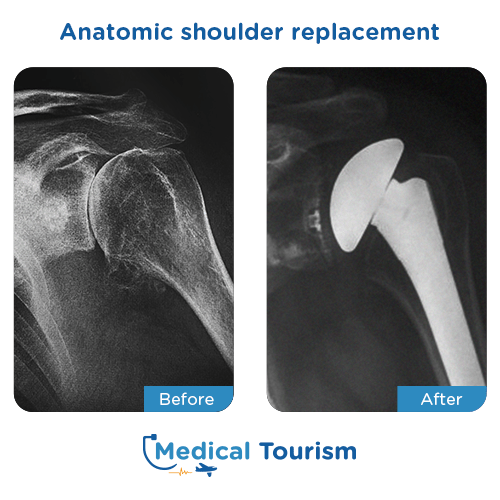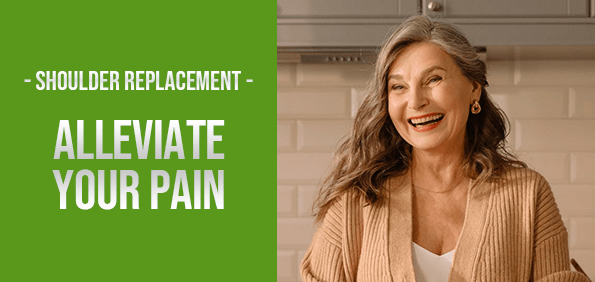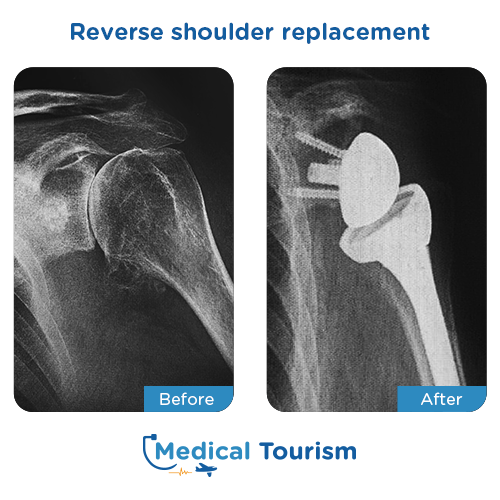The best board-certified doctors abroad
Shoulder replacement information and international destinations
Shoulder replacement surgery involves the removal of damaged portions of the shoulder bones and replacing them with a prosthetic device to restore mobility and function. This surgical procedure is recommended for individuals with advanced arthritis or significant rotator cuff injuries.
Under general anesthesia, the orthopedic surgeon will remove the upper part of the humerus bone and replace it with a metal ball. Additionally, a plastic cover will be placed on the shoulder socket to facilitate smooth movement, alleviate pain, and reduce stiffness in the shoulder.
There are two main types of shoulder replacement procedures
Anatomic shoulder replacement.
This type is typically recommended for patients with severe osteoarthritis who still have intact rotator cuff tendons. It aims to replicate the natural shoulder anatomy and is the most performed procedure. The prosthesis consists of a metal ball with a stem attached to the humerus bone, along with a plastic socket that is placed in the shoulder joint.
Reverse shoulder replacement.
This type is recommended for patients with severe osteoarthritis, rotator cuff tears, or those who have previously undergone an unsuccessful shoulder replacement. In a reverse shoulder replacement, the configuration is altered compared to the anatomic replacement. The metal ball is attached to the shoulder socket, while the plastic socket is placed on the humerus bone. This reversed design helps compensate for the compromised rotator cuff function and improves shoulder functionality.
Get shoulder replacement surgery with board-certified orthopedists in the best international destinations!
Benefits
Improves mobility
Eliminates joint pain
Long lasting prosthesis
Allows an active lifestyle
Eliminates joint pain
Long lasting prosthesis
Allows an active lifestyle
Includes
Partial or total custom-made prosthesis.
Shoulder replacement
Procedure:
4 hrs.
Hospital stay: 4 hrs.
Cleared to fly: 10 - 15 days
Hospital stay: 4 hrs.
Cleared to fly: 10 - 15 days
After surgery
Out of town patients’ follow-ups are scheduled with the orthopedic surgeon after 10 - 15 days of shoulder replacement surgery. Patients are clear for flying after 10 - 14 days from shoulder replacement surgery.
Note: Follow-ups can be arranged as face-to-face or virtually. If needed, you can go to your primary care physician to remove sutures or get medication adjustments.
Before and after images
View before and after pictures from real patients.

View more



Shoulder replacement surgery frequent questions
Get answers to our most frequently asked questions and what to expect after the procedure.
Is shoulder replacement surgery suitable for me?
Shoulder replacement surgery is typically recommended for individuals with severe osteoarthritis, rotator cuff tears, or a combination of both. It is essential to consult with a board-certified orthopedic surgeon who can evaluate your specific condition and determine if you are a suitable candidate for the surgery.
What precautions should I take after the surgery?
After the surgery, your doctor will provide you with specific precautions based on your individual needs. Some common precautions may include keeping your arm close to your body while wearing the sling and avoiding using your arm to push yourself out of bed or a chair.
What is the duration of rehabilitation?
The duration of rehabilitation after shoulder replacement surgery can vary depending on various factors. The success of the surgery is often linked to how well the patient adheres to post-operative instructions. Your orthopedist or physiotherapist will provide you with appropriate exercises that you can perform at home or at a rehabilitation clinic to aid in your recovery.
Disclaimer: This information does not reflect the medical advice from our clinics. All cases are different and this treatment may not suit you. Always refer to a medical professional with the certification and experience. All of our physicians are fully qualified to perform these procedures. For more information and diagnosis contact one of our top specialized clinics.
In all medical procedures, there are chances of complications, the specialist will provide you detailed information about the risks of the procedure, talk to the specialist directly.
In all medical procedures, there are chances of complications, the specialist will provide you detailed information about the risks of the procedure, talk to the specialist directly.


